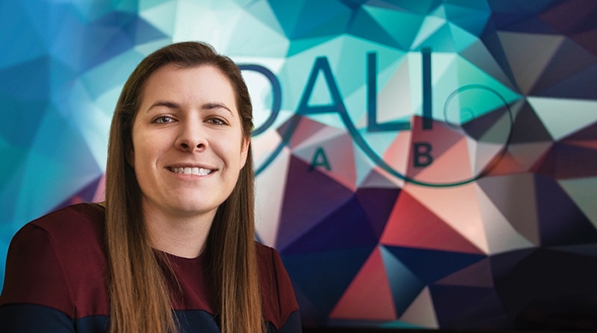This story was originally published in the Dartmouth College Fund’s spring 2015 issue of “From the GREEN.”

“DALI has been a great experience for me, especially in terms of getting real-world programming and project management skills,” says Diana Salsbury. (Photo by John Sherman)
Diana Salsbury ’15, from Baltimore, Md., came to Dartmouth with a love of classics—and discovered a passion for programming. Now the College’s only classics-computer science double major, she is a mentor at Dartmouth’s Digital Arts, Leadership, and Innovation Lab (DALI) and has helped design and build several computer apps, including Art2Artifact, an online database for categorizing and studying ancient Roman coins.
From the GREEN spoke with Salsbury about her Dartmouth experience:
Steve Jobs was my hero when I was growing up, and I thought I wanted to study engineering at Dartmouth. But I quickly realized that traditional engineering wasn’t for me. If you have a good idea or want to make a product, it takes a long time to bring it to life. In computer science you can code something up quickly. If it doesn’t work, you can do something different right away. I like that ability to make instant changes, so it was a natural shift to computer science.
I’ve been involved with DALI since it started in 2013. I had been a Women in Science Project mentee in my freshman year, and I got matched with DALI co-founder Lorie Loeb in the Digital Arts department. The first project I did was basically an introduction to web programming, which I’d never done before. I loved learning the practical programming skills.
I went back to Professor Loeb my sophomore year and asked for another project, and Art2Artifact was there waiting for me. The project, the brainchild of Professor Roberta Stewart in the classics department, involved creating a database of the ancient coins in the Hood Museum of Art. Coin study involves a lot of data collection and aggregation, and most of the time you have to flip through these huge reference books to match coins with illustrations, which takes forever. So I made a digital database that allows students to examine the coins, add information, and categorize them into small sub-collections called corpora—all of which are really important for coin study.
Making Art2Artifact was both cool and scary. While I was really excited to do it, I wasn’t sure I knew enough to actually make the project work. It was challenging, but fun. Now it’s exciting for me to go to the site and see more coins there every day.
DALI has been a great experience for me, especially in terms of getting real-world programming and project management skills. This past summer I had an internship at Google in California, working on the Google Ads team, and they offered me a job for next year. They have some really interesting projects to work on and fascinating problems to solve. DALI and Dartmouth have given me the confidence to feel like I’m ready to tackle them.
